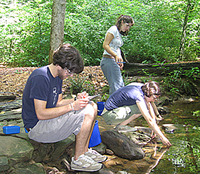 Schedule
Schedule
The duration of the internship is 10 weeks. Interns will be based in NCEH/ATSDR
offices where they will engage in summer-long projects; they will also
participate in trips and activities that expose them to many facets of
environmental health.
Week 1: Orientation
Day 1: Trip to CDC Roybal campus to get fingerprinted for identification badges, take a tour of the campus, and view the current exhibit at CDC’s Global Health Odyssey Museum. Introductions to senior staff, safety orientation, tour of Chamblee campus, general information orientation.
Day 2: Group orientation of CDC/ATSDR to learn about environmental health, led by Howard Frumkin, M.D., Dr. P.H. Director of NCEH/ATSDR. Introduction to public health, meet with mentors, panel introduction of Divisions, introduction to project supervisors and personal projects.
Day 3: Welcome from ORISE, Environmental health lab tour, history of CDC, introduction to environmental health, computer safety training. Interns will have a chance to set up offices and get acquainted with their supervisors. Evening fun activity.
Week 2-8:
Week 9: Wrap up project, prepare final presentation, and work on climate change presentation.
- Ongoing involvement in projects
- Weekly activities (journal and current event clubs, brown bag lunches, field trips, etc)
- Speaker’s Bureau Training
Week 10: Final Presentations, Overall Wrap-Up, Next Steps, Evaluations
- Power point presentations
- Summer experience
- Climate change topic
- Wrap-Up lunch with interns and mentors
- Evaluation forms, badge return, etc.
- Final writing requirement
Programming
- Shadowing of senior officials/scientists in NCEH/ATSDR.
- Informal "Brown-Bag" lunches with CDC staff.
- Field Trips. For example, biological and chemical stream water monitoring, a trip to an air monitoring station, a day with a state and/or local health department, etc. Typically field trips will be combined with a relevant speaker and will take place on Friday.
- Formal lunch presentations/lectures from people outside CDC involved both in environmental health and fields that intersect environmental health, such as transportation and urban planning.
- Interns will also have the opportunity to attend open CDC lectures/presentations.
- Possibility of travel to local meetings/conferences on environmental health topics.
- Organization of social activities (Braves game, bowling, etc.).
This page last updated on November 24, 2008


